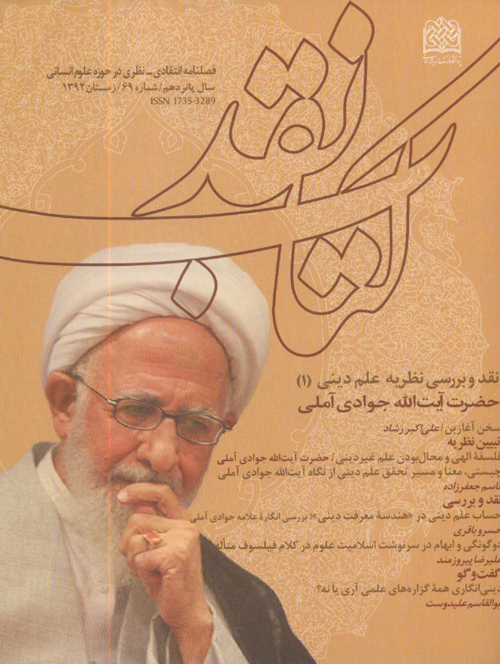فهرست مطالب

نشریه کتاب نقد
پیاپی 69 (زمستان 1392)
- بهای روی جلد: 70,000ريال
- تاریخ انتشار: 1393/09/10
- تعداد عناوین: 7
- سرآغاز
-
صفحه 7
-
صفحه 13
- تبیین نظریه
- نقد و ارزیابی
- گفت و گو
-
Page 45The possibility of the realization of religious science is one of the important challenging issues which have proponent and opponent attitudes. Introducing the angels of religious knowledge triangle (reason (aql), narrated tradition (naql), revelation), Ayatollah Javadi Amoli presents the strategy for producing religious science by the proper and maximum use of reason (intuitive, abstractive, semi-abstractive and experimental) and narrated tradition (methodological understanding revealed texts) interactively. He holds that science explores the reality and thus whatever is really science would be religious. Explaining the important position of absolute philosophy in clarifying Islamic ontology and the drawing the path for Islamization of science, he holds that the conflict between science and religion or reason and revelation is meaningless. He believes that reason, like narrated tradition, is divine authority and explorer of revelation; if there is any conflict, it might be between rational and traditional (Aql and Naql) proofs. There will never be any conflict between science and religion.Keywords: religion, science, reason (Aql), narrated tradition (naql), religious science
-
Page 75This article tries to criticize and investigate the beliefs supporting “geometry of religious knowledge” on the subjects of religion, science and the relation between religion and reason; in such scope, the tenet of religious science according to this attitude will be critically analyzed. The article is to discuss the following concerns: the In the study of beliefs related to religion issues such as the confusion between religious and existential affairs, contradiction of broad and expanded definition for religion and the encyclopedic characteristic of religion; in the study of beliefs related to science issues such as raw realism and its prerequisites; in the study of beliefs related to the relation between religion and reason issues such as making reason as to be obedient, the confusion between religious and existential affairs, the confusion between potential and actual reason, neglecting executive judgment of reason and the undisciplined geometry in which reason didn’t reach its appropriate position. On the issue of religious science the idea derived from the theory of “geometry of religious knowledge” has been criticized from the following aspects: passive feature and accepting the existing theories; suspension manner for specifying the exploration of reality; the danger of religious dogmatism in opposing scientific discoveries; tendency toward Fiqh and mixing the logic of Mukallaf (the one who is responsible and accountable for Islamic obligations) with the realistic logic of scientific atmosphere; and simplifying the islamization of university and teaching resources. According to the problems in “geometry of religious knowledge”, a substitution is proposed: instead of regarding reason and narrated tradition 3Vol. 15 - no. 69- winter 2014 as two wings for flying religion and religious knowledge, it must be considered that reason and religion, with relative independence, are two wings of human being for flying which have Interference in the root and interaction in margins.Keywords: Javadi, Amoli, religion, reason, religious science, Islamic university, divine legislation, genesis
-
Page 129This article firstly exposes the speeches of the Grand Ayatollah Abdollah Javadi-Amoli – the learned master, philosopher, theosophist, Faqih, and prominent interpreter of the holy Quran- as the prologue for the study on his thought. In this exposition, the pillars and the results are segregated. The pillars are as: 1. Study of religion; 2.Study of Science; 3.Study of philosophy; 4.Study of intellect The results are as: The meaning of Science as being Islamic based on the aforementioned principles; identifying the responsibilities in relation with the sciences of the modern era. The evaluation of Javadi-Amoli’s thoughts is conducted in this form; through this evaluation some questions are raised and the truthfulness of the proposed principles and the results are dependent on the answers. In this article the reading is presented that shows two completely different theories could be taken from his thoughts; based on one theory most of the available sciences is Islamic without any serious changes and based on the other theory most of the available sciences need fundamental changes. According to the writer of this article, one of these two theories is totally acceptable and the other theory has serious problems and ambiguity in the principles and consequences.Keywords: Islamic sciences, study of religion, study of science, study of philosophy, study of intellect

